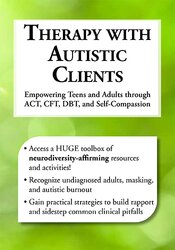
×

The correlation between autism and anxiety, phobias, suicidality, depression, and other mental health disorders is well-established.
But the complexities involved in treating autistic and other neurodivergent clients often result in less-than-ideal clinical outcomes.
Watch Jennifer Gerlach, LCSW, a neurodivergent psychotherapist and author, in this one-of-a-kind course focused on giving you the confidence and specialized intervention tools you need to maximize your therapeutic results in working with teens and adults with diagnosed or suspected autism.
You will finish with the ability to:
Purchase now to effectively meet the critical needs of this growing population.
All members of the PESI, Inc. planning committee have provided disclosures of financial relationships with ineligible organizations and any relevant non-financial relationships prior to planning content for this activity. None of the committee members had relevant financial relationships with ineligible companies or other potentially biasing relationships to disclose to learners. For speaker disclosures, please see the faculty biography.
NOTE: Tuition includes one free CE Certificate (participant will be able to print the certificate of completion after passing the online post-test (80% passing score) and completing the evaluation). Instructional methods will include PowerPoint, didactic lecture, and others.
Continuing Education Information: Listed below are the continuing education credit(s) currently available for this non-interactive self-study package. Program content is reviewed periodically per accrediting board rules for currency and appropriateness for credit. Credit approvals are subject to change. Please note, your licensing board dictates whether self-study is an acceptable form of continuing education, as well as which credit types are acceptable for continuing education hours. Please refer to your licensing board's rules and regulations. If your profession is not listed, please contact your licensing board to determine your continuing education requirements and check for reciprocal approval.
For other credit inquiries not specified below, please contact info@pesi.com or 800-844-8260 before purchase.
Materials that are included in this course may include interventions and modalities that are beyond the authorized practice of your profession. As a licensed professional, you are responsible for reviewing the scope of practice, including activities that are defined in law as beyond the boundaries of practice in accordance with and in compliance with your profession's standards.
For Planning Committee disclosures, please see the statement above. For speaker disclosures, please see the faculty biography.
Earn up to 6.0 CE hours. Please see below, for more details, as credit amounts vary by jurisdiction and profession.

PESI, Inc., #1062, is approved as an ACE provider to offer social work continuing education by the Association of Social Work Boards (ASWB) Approved Continuing Education (ACE) program. Regulatory boards are the final authority on courses accepted for continuing education credit. ACE provider approval period: January 27, 2023 - January 27, 2026. Social workers completing this course receive 6.0 Clinical continuing education credits.
Course Level: Intermediate Format: Recorded asynchronous distance. Full attendance is required; no partial credits will be offered for partial attendance.
Canadian Social Workers: Canadian provinces may accept activities approved by the ASWB for ongoing professional development.
PESI, Inc. is approved by the Canadian Psychological Association to offer continuing education for psychologists. PESI, Inc. maintains responsibility for the program. This program is approved for 6.0 self-study continuing education hours. Full credit statement at: www.pesi.com/cpa-statement
This self-study activity qualifies for 6.0 continuing education clock hours as required by many national, state and local licensing boards and professional organizations. Save your activity advertisement and certificate of completion, and contact your own board or organization for specific requirements.

This self-study course has been approved by PESI, Inc., as a NAADAC Approved Education Provider, for educational credits. NAADAC Provider #77553. PESI, Inc. is responsible for all aspects of their programming.
This self-study course offers 6.0 continuing education contact hours in the Counseling Services skill group. Full attendance is required; no partial credit will be awarded for partial attendance.
| File type | File name | Number of pages | |
|---|---|---|---|
| Manual - Therapy with Autistic Clients (33.8 MB) | 172 Pages | Available after Purchase | |
| Manual - Therapy with Autistic Clients - French (33.8 MB) | 172 Pages | Available after Purchase | |
| Manual - Therapy with Autistic Clients - Italian (33.8 MB) | 172 Pages | Available after Purchase |

Jennifer Gerlach, LCSW, is a psychotherapist in private practice in southern Illinois specializing in the crossroads of mental health and neurodiversity. Jennifer is the author of The Psychosis and Mental Health Recovery Workbook: Tools for Young Adults from ACT, DBT and Recovery-Oriented CBT and writes a blog for Psychology Today entitled ‘Beyond Mental Health: Defying Stereotypes and False Limitations.’
An advocate for neurodiversity-affirming care, Jennifer has provided training to hundreds of clinicians nationwide on topics of neurodivergent youth, and empowering young adults living with mental illness, psychosis, and mental health recovery. She is an autistic person herself who offers a unique perspective infused with lived experience.
Speaker Disclosures:
Financial: Jennifer Gerlach maintains a private practice and receives royalties as a published author. She receives a speaking honorarium from PESI, Inc. She has no relevant financial relationships with ineligible organizations.
Non-financial: Jennifer Gerlach has no relevant non-financial relationships.
Access never expires for this product.
For a more detailed outline that includes times or durations of time, if needed, please contact cepesi@pesi.com.
Visit our FAQ page at https://www.pesicanada.ca/faq or contact us at https://www.pesicanada.ca/contact-us.
Core Concepts of Autism and Other Neurodiversities
Foxes and wolves: experiencing the world differently
Neurodiversity Screening and Assessment
Autism in the Therapy Room
From Knowledge to Practice
Address the Fall-Out of Living in a Neurotypical World
Counselling Autistic Adults
Practical Applications of Inclusive Therapy Modalities
Counselling Autistic Teens
Interventions with a slightly different approach
Satisfaction Guarantee
Your satisfaction is our goal and our guarantee. Concerns should be addressed to info@pesicanada.com.
Please wait ...